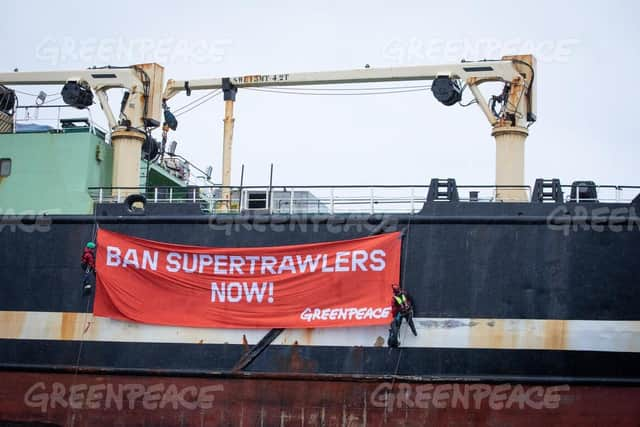Lancaster MP’s government plea to help protect our marine life from 'supertrawlers'
and live on Freeview channel 276
“I’ve had a huge number of constituents writing to me about this issue – and with good reason,” said Ms Smith.
“Supertrawlers are high intensity fishing vessels over 100m long and capable of catching and carrying thousands of tonnes of fish. This intensive form of fishing is devastating the marine ecology in areas that are supposed to be protected.”
Advertisement
Hide AdAdvertisement
Hide AdIn addition, Ms Smith is calling for the banning of bottom-trawling - a hugely destructive type of fishing which tears up marine habitats by dragging heavy nets across the seafloor.


“These practices are driven by nothing but greed," she said. "In my constituency we still have small-scale fishermen whose livelihoods are quickly becoming unviable whilst huge factory boats scoop up all the fish in sight. Two-thirds of our fish species are in decline. This can’t be right.”
Ms Smith has written to Mr Jayawardena, requesting the government takes immediate action.
“In my letter to the Environment Secretary I’ve impressed upon him just how many constituents have written to me about this issue," she said. "At the moment it’s second only to fracking in the numbers of people opposed.
Advertisement
Hide AdAdvertisement
Hide Ad"Furthermore, in 2020, 23 supertrawlers operated in UK waters yet none of them were UK owned.
“Indeed, the majority were Russian owned. As Greenpeace says, it's like driving a bulldozer through a nature reserve.”
“If MPAs are to be effective at protecting our marine environment they need to be closed to the most destructive fishing vessels.
"It’s extremely troubling that this is not currently the case and undermines the UK’s claims to be a world leader in this area. This should not be hard for the Government to address.”
Advertisement
Hide AdAdvertisement
Hide AdMs Smith has discussed her concerns with Greenpeace, who have also been lobbying government to do more to protect our waters and our marine life.
“The government has been big on talk, but feeble on action,” said Fiona Nicholls, Oceans Campaigner at Greenpeace UK. “It makes no sense to call an area ‘protected’ if relentless industrial fishing is allowed there.
" Along with MPs like Cat Smith, we’re asking the new government to change this by making a simple tweak to commercial fishing licences to ban industrial fishing in Marine Protected Areas.
"The government hands out these licences every December, and by adding a simple clause, they could easily protect our oceans in 2022 for generations to come. Everything is in place; all they need is the will to make it happen.”
Marine Protected Areas
Advertisement
Hide AdAdvertisement
Hide AdWest of Walney, Fylde and Liverpool Bay are the nearest MPAs to the Lancaster and Morecambe area.
West of Walney is an area 8km off the Cumbrian coast. It includes a particular type of mud habitat, characterised by the presence of sea-pens (feather-like soft corals) and burrowing animals such as mud shrimp, prawns and the Norway lobster.
The presence of prawns and lobster makes it an area of high commercial fishing interest.
The area is also the site of the world's largest operational offshore wind farm, generating clean electricity for nearly 600,000 homes.